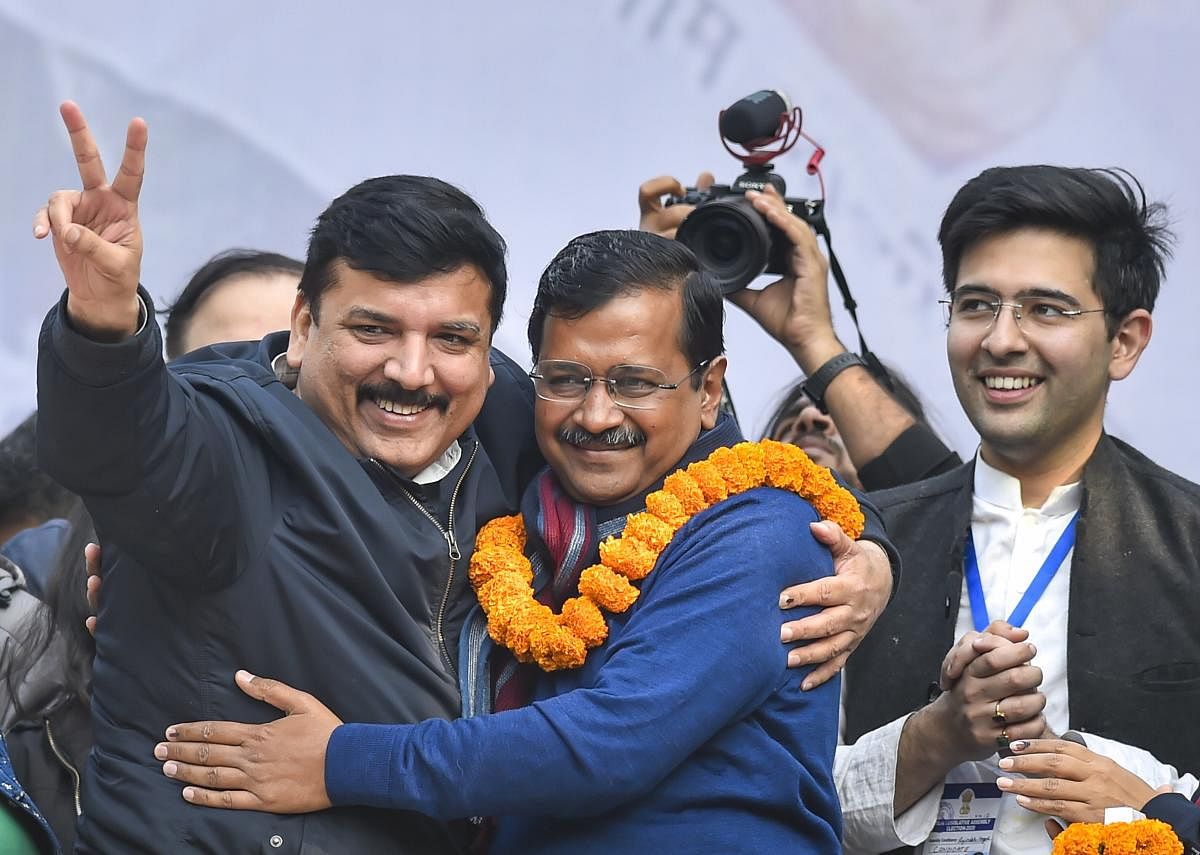
Yes, the victory of the Aam Admi Party in the Delhi Assembly elections seems to have conveyed a meaningful message to the BJP, a party that seems to believe that the power it enjoys is necessarily immortal, and its narcissistic leaders—driven by all sorts of symbolic and verbal violence directed to the constructed ‘enemy’ of the nation—can always shape people’s consciousness through a discourse of militant nationalism and triumphant Hindutva. Possibly, the victory of the AAP indicates that everyday concerns of ordinary people relating to water and electricity, health and education, and safety and air pollution matter, and Kejriwal’s team has aroused the confidence that, far from being obsessed with big ‘ideological’ issues, it can make a sincere effort to fulfill these survival needs.
However, there is a problem that needs to be addressed. The culture of liberating politics cannot remain silent on, or indifferent to, a larger vision relating to the making of the nation. In fact, there is no reason to believe that if you stress on ‘infrastructure’, you need not reflect on ‘ideology’. Because politics is not just an exercise in ‘value-neutral’ social work—a techno-managerial skill for constructing hygienic toilets at schools or developing the infrastructure of moholla clinics. Yes, these things matter; but then, politics is also about the kind of society we wish to create: its engagement with the dynamics of the market, state, religion and identity.
In this sense, the practice of meaningful politics ought to have its pedagogy; it is about activating people’s consciousness and enabling them to see the link between the everydayness of the world and the larger structural issues. And particularly at a time when the ideology of the ruling regime—I mean a mix of market-driven neoliberal ethos and majoritarian Hindu nationalism—has invaded our consciousness, it is absolutely important to know whether the AAP or for that matter any other opposition party does have a counter-hegemonic ideology. Or is it that nothing matters more than the temporality of electoral victory?
To begin with, let us reflect on the edifice of a possible alternative ideology to counter what we have been witnessing these days: the might of majoritarianism, militant nationalism, stigmatization of the minorities and growing economic disempowerment of the poor and the subaltern. Well, as far as our quest for the spirit of pluralism and spiritually enriched secularism is concerned, it is important to engage with Mahatma Gandhi continually: his religiosity as love and compassion, his cross-religious sensibilities, and his satyagraha as a profound art of resistance against what is immoral and unethical. In Gandhi, we see a vision that can take us beyond Hindutva, or the manipulative use of religion as an ‘identity’ that causes hatred and division.
Likewise, Rabindranath Tagore’s deep reflections on the violence of totalitarian nationalism ought to give us an important lesson: the act of worshipping the abstracted ‘nation’—a cumulative expression of our egos—often brutalizes our consciousness and causes great harm to the ethos of empathic and compassionate universalism. In other words, as the history of war or holocaust suggests, non-reflexive nationalism is not necessarily a good idea to cherish.
Likewise, in a country like ours, with heightened socio-economic inequality and associated violence, we long for a philosophic praxis of equity and justice. And it is in this context that a nuanced experiment with Ambedkar, Marx and Gandhi becomes important. Yes, Ambedkar came with a hammer, sought to awaken the marginalized castes of their ability to overcome the burden of imposed silence, and alter history; he also made the privileged castes see the violence implicit in some of our dharmashastras.
And Marx gave us a deep insight into the recurrence of structural inequality implicit in the functioning of, say, modern capitalism. Even if the ‘socialist revolution’ failed, and neoliberalism emerged, it is difficult to negate the importance of a welfare state committed to shared public concerns like health, education and economic sustainability.
And Gandhi, with his visionary insight, could see the danger in what can be regarded as environmentally destructive and consumption-centric techno-development because it intensifies greed, and annihilates the principle of communitarian socialism or Sarvodaya. Possibly, we need a creatively nuanced politico-intellectual engagement with all these three thinkers to evolve a philosophy of justice and equity.
However, the irony of contemporary politics—even opposition politics— is that it has become primarily utilitarian. In a way, some sort of piecemeal social engineering, or utterly regional/narrow concerns occupy their politics. The likes of Mayawati, to take an illustration, seldom bother to see beyond their caste constituency and come forward with a broader worldview. Then, some assure the delivery of laptops or bicycles to schoolchildren or promise yet another round of reservation; others give a gift to women: a free ride in Delhi metro trains. In this ‘giver-receiver’ or ‘patron-client’ relationship, there is no critical consciousness or no urge for radical social transformation.
Furthermore, some sort of poverty of imagination blocks the possibility of the cultivation of a coherent, democratic, egalitarian ideology of alternative politics. The Left-Ambedkarites refuse to engage with Gandhi on any issue, be it caste, religion or economy; the ‘centrists’ of the AAP prefer to support the abrogation of Article 370, remain diplomatically silent on Shaheen Bagh— the Muslim women’s nonviolent resistance against the discriminatory character of the CAA -- and propose ‘deshbhakti curriculum’ to defeat the BJP at its own game of ‘patriotism’.
Well, the victory of AAP in Delhi is seen to be a relief from the BJP’s toxic politics; in a way, it is a blow to the ‘Chanakyas’ of our times. But then, we would be making a mistake if we remain contented with just the electoral victory, and do not strive for something higher and deeper: an ideology of liberation.
(The writer is Professor of Sociology at JNU)